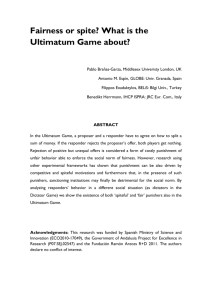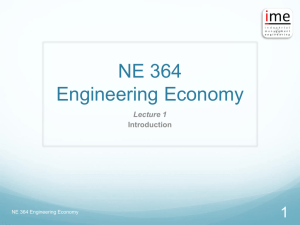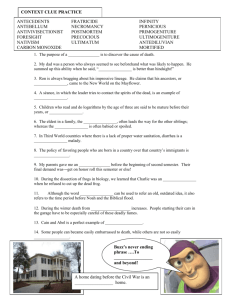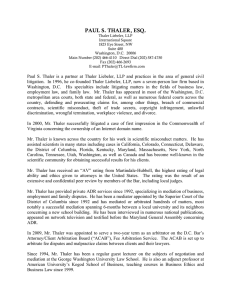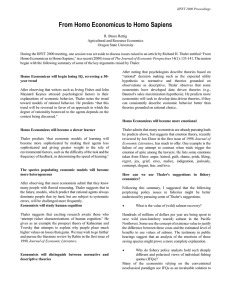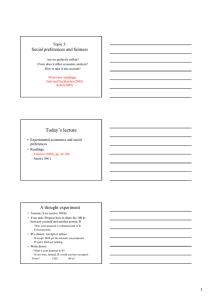Game Theory Spring 2015
advertisement
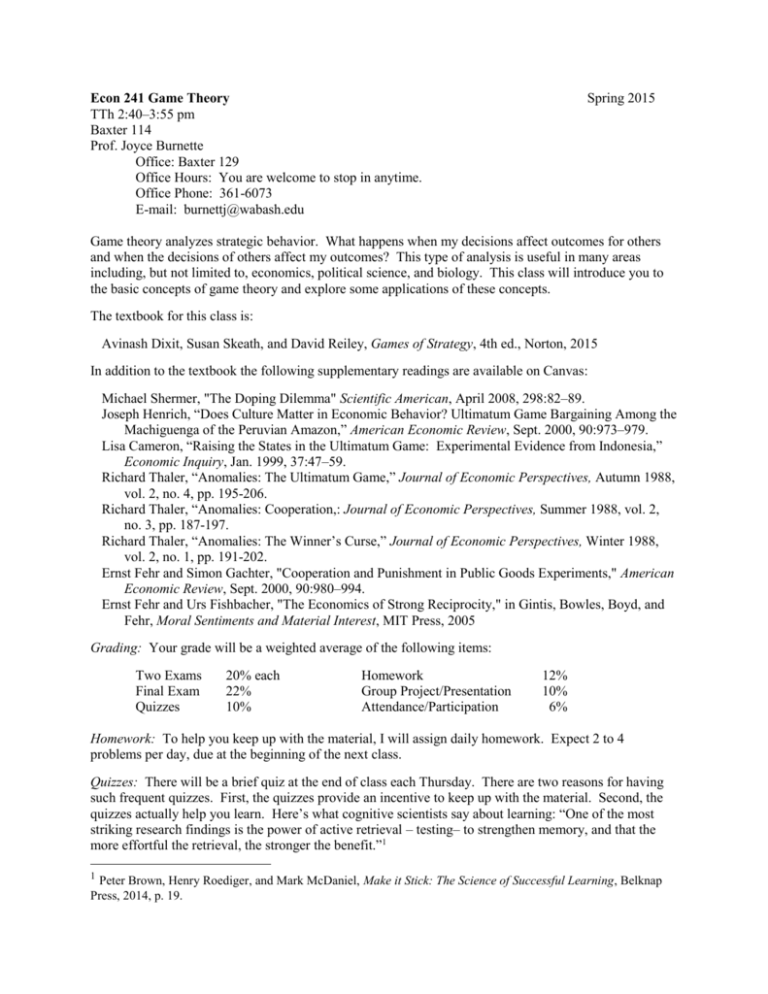
Econ 241 Game Theory TTh 2:40–3:55 pm Baxter 114 Prof. Joyce Burnette Office: Baxter 129 Office Hours: You are welcome to stop in anytime. Office Phone: 361-6073 E-mail: burnettj@wabash.edu Spring 2015 Game theory analyzes strategic behavior. What happens when my decisions affect outcomes for others and when the decisions of others affect my outcomes? This type of analysis is useful in many areas including, but not limited to, economics, political science, and biology. This class will introduce you to the basic concepts of game theory and explore some applications of these concepts. The textbook for this class is: Avinash Dixit, Susan Skeath, and David Reiley, Games of Strategy, 4th ed., Norton, 2015 In addition to the textbook the following supplementary readings are available on Canvas: Michael Shermer, "The Doping Dilemma" Scientific American, April 2008, 298:82–89. Joseph Henrich, “Does Culture Matter in Economic Behavior? Ultimatum Game Bargaining Among the Machiguenga of the Peruvian Amazon,” American Economic Review, Sept. 2000, 90:973–979. Lisa Cameron, “Raising the States in the Ultimatum Game: Experimental Evidence from Indonesia,” Economic Inquiry, Jan. 1999, 37:47–59. Richard Thaler, “Anomalies: The Ultimatum Game,” Journal of Economic Perspectives, Autumn 1988, vol. 2, no. 4, pp. 195-206. Richard Thaler, “Anomalies: Cooperation,: Journal of Economic Perspectives, Summer 1988, vol. 2, no. 3, pp. 187-197. Richard Thaler, “Anomalies: The Winner’s Curse,” Journal of Economic Perspectives, Winter 1988, vol. 2, no. 1, pp. 191-202. Ernst Fehr and Simon Gachter, "Cooperation and Punishment in Public Goods Experiments," American Economic Review, Sept. 2000, 90:980–994. Ernst Fehr and Urs Fishbacher, "The Economics of Strong Reciprocity," in Gintis, Bowles, Boyd, and Fehr, Moral Sentiments and Material Interest, MIT Press, 2005 Grading: Your grade will be a weighted average of the following items: Two Exams Final Exam Quizzes 20% each 22% 10% Homework Group Project/Presentation Attendance/Participation 12% 10% 6% Homework: To help you keep up with the material, I will assign daily homework. Expect 2 to 4 problems per day, due at the beginning of the next class. Quizzes: There will be a brief quiz at the end of class each Thursday. There are two reasons for having such frequent quizzes. First, the quizzes provide an incentive to keep up with the material. Second, the quizzes actually help you learn. Here’s what cognitive scientists say about learning: “One of the most striking research findings is the power of active retrieval – testing– to strengthen memory, and that the more effortful the retrieval, the stronger the benefit.”1 1 Peter Brown, Henry Roediger, and Mark McDaniel, Make it Stick: The Science of Successful Learning, Belknap Press, 2014, p. 19. Group Project: You will work in groups of three students. Your task is to take a “real-life” situation, model it as a game, and apply the solution concepts learned in this class. The “real-life” situation may come from a movie or book, or from an actual historical instance. Your group will produce a short paper (4-6 pages) and present your game to the class. Schedule: Date Event Jan. 20 22 27 29 Best Response Functions, Critiques of Nash Equilibrium Extensive Form Games Experimental Evidence; The Ultimatum Game Feb. 3 5 10 12 17 19 24 26 Mar. 3 5 17 19 24 26 31 Apr. 2 7 Topic Definitions, Normal Form Games Prisoner's Dilemma; Nash Equilibrium, Dominance Motivation in Prisoner’s Dilemma; Coordination The Ultimatum Game Order of Play; Nature Applications Reading Ch. 2.1–2.4 Ch. 4.1–4.5 Michael Shermer, “The Doping Dilemma” Ch. 4.6–4.7 Ch. 5 Ch. 3 Henrich, “Does Culture Matter in Economic Behavior?”; Cameron, “Raising the Stakes” Thaler, "The Ultimatum Game" Ch. 6 TEST ONE Mixed Strategies Mixed Strategies Signaling Signaling SPRING BREAK Threats and Credibility Brinkmanship Repeated Prisoner's Dilemma Ch. 7.1–7.5 Ch. 7.6–7.9 Ch. 8.2–8.4 Ch. 8.5-8.6 Public Goods Cooperation and Public Goods Public Goods Experiments; Auctions Ch. 11 Thaler, "Cooperation" Fehr and Gachter, "Cooperation and Punishment in Public Goods Experiments" Thaler, "The Winner's Curse"; Ch. 16 Ch. 9 Ch. 14 Ch. 10 TEST TWO 9 Auctions 14 16 21 23 28 30 Presentations Presentations May 7 FINAL 1:30 pm Evolution Evolution Voting Reciprocity Ch. 12.1-12.4 Ch. 12.5-12.8 Ch. 15 Fehr and Fischbacher, "The Economics of Strong Reciprocity"
